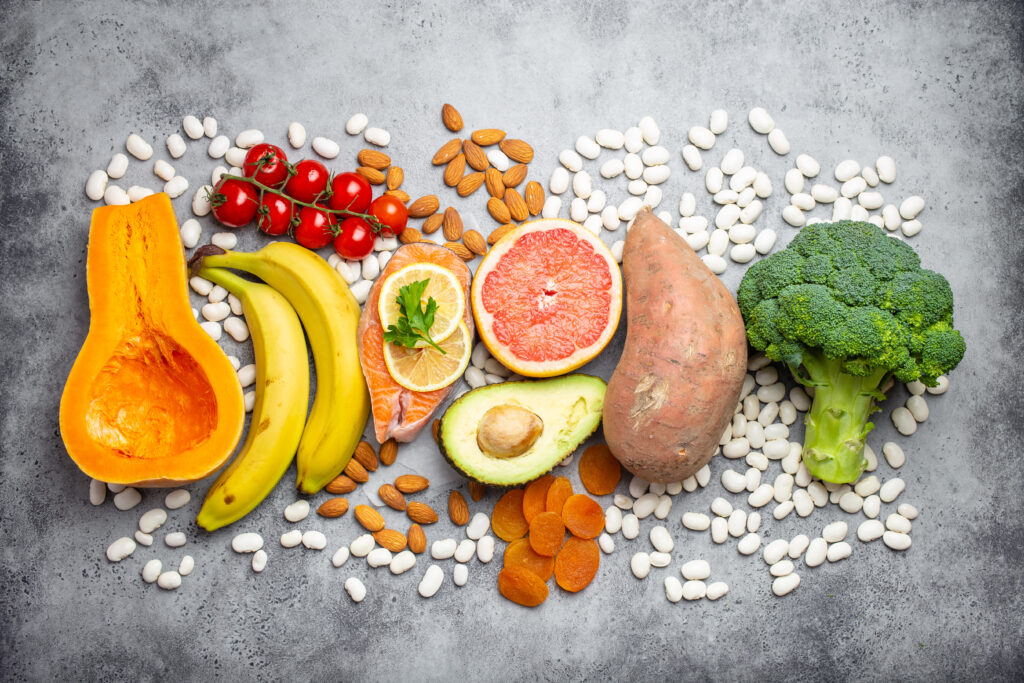
Potassium is the third most abundant mineral found in the human body. A highly water-soluble mineral, it is mostly intra-cellular, about 80% of it being stored inside the muscles.
First isolated in the 1800s by Humphry Davy using electrolysis, potassium derives its name from “potash” – which literally means ash from the pot of dried vegetables and leaves. As a metal, potassium has a soft core and can be cut with a knife. Potassium is a vital electrolyte in cellular function and its intake is important in health as potassium has significant benefits.
Functions of potassium
Potassium is involved in various functions within the human body. It’s principle role is to function with sodium in creating an electrical signal across various cell membranes. In muscle cells, this electrical signal leads to contraction. The critical roles of potassium are described below:
Muscle contraction: Potassium resides inside the cells and its concentration is maintained so by a specialized sodium-potassium ATPase channel, which is a pump present along the cell membrane. By keeping potassium ions inside the cells, it allows sodium to concentrate on the outside maintaining the electrical gradient for cell signal. The flow of these electrolytes across cell membranes creates an electrical signal called action potential that leads to muscle contraction.
Cardiac contractility: Potassium is vital in maintaining cardiac rhythm and contractility. Low potassium levels can frequently lead to cardiac arrhythmias.
Maintenance of vascular health and blood pressure: Potassium maintains the vascular tone of the blood vessels. Low potassium levels can often lead to high blood pressure.
Transmission of signals through the nerves: Working as a neurotransmitter, potassium allows transmission of nerve impulses to muscles.
Regulation of fluid balance: localization of potassium inside the cells keeps fluid balance within the cells intact.
Deficiency of potassium
In general, deficiency of potassium is uncommon in young athletes who eat a healthy diet rich in fruit and vegetables. Potassium deficiency usually results from a clinical condition such as diarrhea, vomiting or a prolonged illness which is marked by a nutritional deficiency (e.g. a prolonged ICU stay due to sepsis).
Some genetic conditions may lead to a potassium loss in the urine. These are typically rare and are associated with magnesium loss in the urine as well. Magnesium deficiency can lead to potassium wasting in the urine and is commonly seen in some individuals.
Potassium is excreted mainly in the urine but can be lost through the gut in large amounts. Any condition that leads to significant diarrhea (infectious or inflammatory) can result in significant potassium deficiency.
Urinary losses of potassium are also frequently seen in individuals who are maintained on diuretic for heart failure. The loss of water and sodium is often accompanied with that of potassium leading to a deficient status. A prolonged deficiency of potassium in the blood is seen in these patients that can lead to a total body depletion of potassium stores.
Symptoms of potassium deficiency

If the deficiency of potassium persists for a long time due to losses or inadequate intake, the total body stores of potassium (particularly in muscles) fall significantly. This can lead to significant muscle weakness.
Initially, potassium deficiency can simply present as fatigue or tiredness. A moderate deficiency status can lead to muscle weakness and cramps or even abnormal heart rhythms in a susceptible individual.
Severe potassium deficiency can lead to life threatening situations as cardiac muscle as well as respiratory muscles require potassium to function properly. Severe potassium deficiency cannot be treated without hospitalization in which intravenous potassium chloride is frequently administered with cardiac monitoring.
Regulation of potassium in the body
Potassium levels in the body are principally regulated by a balance in the intake, absorption and excretion. Kidneys have specialized channels that allow for “fine tuning” of potassium levels based on the body’s needs and available stores.
These channels are under the control of specialized hormones (such as aldosterone) which determines the extent of potassium excretion. This way, the blood (and total body) stores of potassium are kept in a constant check. Too less or too much of potassium in the blood can affect skeletal muscle and cardiac function and is the signal for the kidney to either conserve or excrete accordingly.
Potassium from dietary sources
The recommended daily intake of potassium is about 3500-5000 mg in most adults based on a 2000 calorie diet. Athletes usually aim at the higher end of the spectrum due to a greater need and a faster utilization by their muscles.
Here is a small list of some potassium rich foods: Avocados, nuts, oranges, bananas, citrus fruits, peaches, kiwis, cherries, yams, potatoes, brussels sprouts, tomatoes, beans and fish.
Beverages such as orange juice, vegetable juices and milk also contain a good amount of potassium. A healthy diet that comprises of protein and mixed vegetables supplies a good daily source of potassium. However, potassium rich foods are restricted in some individuals with kidney disease.
In healthy individuals, potassium rich food intake is associated with better cardiovascular outcomes and improvement in blood pressure in patients with hypertension.
Benefits of potassium intake in athletes

Potassium intake has numerous advantages in athletes. Studies have shown that a higher potassium intake is linked with better cardiovascular outcomes in high-risk diabetic patients.
Potassium intake is vital in supporting the intense muscle activity and workouts that athletes are engaged in day after day. A low potassium level in athletes has shown to be associated with fatigue and cramping.
Severe potassium deficiency can lead to rhabdomyolysis, which is characterized by muscle injury that endurance athletes are quite prone to. Potassium deficiency can also lead to magnesium deficiency and vice versa.
Low potassium levels are linked to delayed recovery in some individuals. Although studies on performance of endurance athletes with different levels of potassium supplementation have never been done, a good dietary intake of potassium (4-5 grams/day) has generally been considered to be vital for most athletes in competitive sports.
The bottom line
Potassium is a vital electrolyte that is quintessential for our wellbeing. It is easy to get from a balanced diet that is rich in fruit and vegetables.
Even in the most finicky eaters, a deficiency of potassium is unusual but in athletes, the requirement may be higher. Potassium deficiency can lead to magnesium deficiency and vice versa and can negatively affect muscle performance.
A healthy electrolyte drink mix such as MAGNAK® provides enough of these vital electrolytes to allow athletes to perform better. Potassium and magnesium supplementation through MAGNAK® can lessen muscle cramps and reduce exercise related soreness in athletes.
Dr. Kharait is an MD and a practicing Nephrologist in Northern California. He completed his Residency in Internal Medicine and Fellowship in Nephrology from the University of California, San Francisco. He has a PhD in Molecular Physiology from the University of Pittsburgh and specializes in treating patients with electrolyte disorders and kidney diseases.
